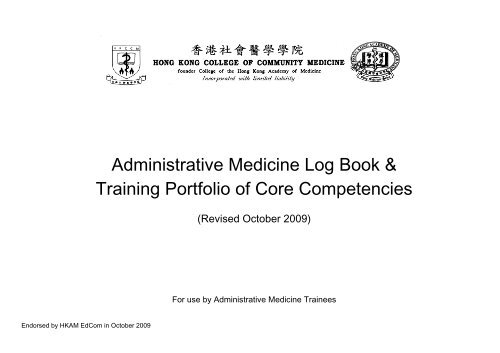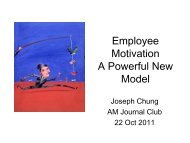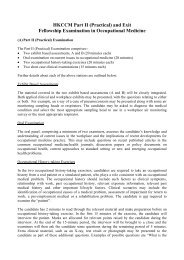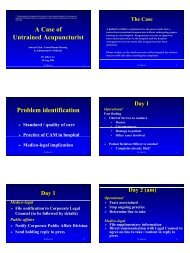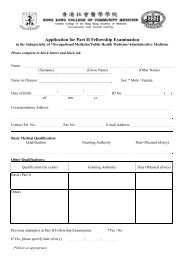Log Book and Training Portfolio - The Hong Kong College of ...
Log Book and Training Portfolio - The Hong Kong College of ...
Log Book and Training Portfolio - The Hong Kong College of ...
Create successful ePaper yourself
Turn your PDF publications into a flip-book with our unique Google optimized e-Paper software.
ContentBackground ....................................................................................................................................................................................................... 1Purpose .................................................................................................................................................................................................. 2Definition <strong>of</strong> Discipline ............................................................................................................................................................................ 3<strong>Training</strong> Objectives ................................................................................................................................................................................. 3<strong>Training</strong> ContentsBasic Trainees ............................................................................................................................................................................. 4Higher Trainees ........................................................................................................................................................................... 4Guidance Notes ................................................................................................................................................................................................ 5Basic Trainees ............................................................................................................................................................................. 6Higher Trainees ........................................................................................................................................................................... 6Example <strong>of</strong> Entry on Core Competency ................................................................................................................................................. 6Trainers .................................................................................................................................................................................................. 7Administrative Medicine Examination Format ......................................................................................................................................... 7Trainee Particulars ............................................................................................................................................................................................ 9<strong>Log</strong> <strong>Book</strong> Component: Administrative Medicine Core Competencies ............................................................................................................. 11Area <strong>of</strong> Administrative Medicine Specialist Practice (1)Analysis <strong>and</strong> decision making .................................................................................................................................................... 12Area <strong>of</strong> Administrative Medicine Specialist Practice (2)Strategic thinking, policy development <strong>and</strong> implementation ....................................................................................................... 13Area <strong>of</strong> Administrative Medicine Specialist Practice (3)Managing change <strong>and</strong> influencing others .................................................................................................................................. 14Area <strong>of</strong> Administrative Medicine Specialist Practice (4)Leadership ................................................................................................................................................................................. 15Endorsed by HKAM EdCom in October 2009
Administrative Medicine<strong>Log</strong> <strong>Book</strong> & <strong>Training</strong> <strong>Portfolio</strong>Of Core CompetenciesBackgroundSource:<strong>Hong</strong> <strong>Kong</strong> <strong>College</strong> <strong>of</strong> Community Medicine<strong>Training</strong> & Examination Guidelines for thesubspecialty <strong>of</strong> Administrative Medicine (April2009)Administrative Medicine <strong>Log</strong> <strong>Book</strong> & <strong>Training</strong> <strong>Portfolio</strong> <strong>of</strong> Core Competencies – <strong>Hong</strong> <strong>Kong</strong> <strong>College</strong> <strong>of</strong> Community Medicine April 20091
PurposeAdministrative Medicine Trainees are required to be exposed to theadministration, service, teaching <strong>and</strong> research components <strong>of</strong>Administrative Medicine during the period <strong>of</strong> training.<strong>The</strong>y are required to keep a log book <strong>of</strong> the following :(a) a history <strong>of</strong> work experiences, responsibilities,management <strong>of</strong> clinical projects <strong>and</strong> specified tasksrelating to Administrative Medicine;(b)a record <strong>of</strong> assessment against competencies asspecified in the training portfolio;(g)(h)(i)academic or pr<strong>of</strong>essional qualifications acquired;assistance in the training <strong>and</strong> supervision <strong>of</strong> juniortrainees;comments, if any, from trainer or training institutions;(c)attendance <strong>and</strong> presentations at review meetings;(j)other information relevant to training.(d)(e)credit points obtained;publications recognised by the <strong>College</strong> <strong>of</strong> CommunityMedicine for training purpose;(k)a minimum <strong>of</strong> 6 ““1000-word dissertation”” to reflect theiraccomplishment <strong>of</strong> the ten competencies required inhigher training in Administrative Medicine. EachMini-thesis should be about 1,000 words.(f) postgraduate courses / formal training sessions /conferences attended during training;Administrative Medicine <strong>Log</strong> <strong>Book</strong> & <strong>Training</strong> <strong>Portfolio</strong> <strong>of</strong> Core Competencies – <strong>Hong</strong> <strong>Kong</strong> <strong>College</strong> <strong>of</strong> Community Medicine April 20092
Definition <strong>of</strong> DisciplineAdministrative medicine is a subspecialty <strong>of</strong> Community Medicine.<strong>The</strong> subspecialty aims to improve the health status <strong>of</strong> the populationthrough the practice <strong>of</strong> evidence-based medicine <strong>and</strong> health servicesmanagement. <strong>The</strong> principles <strong>of</strong> clinical medicine, evidence-basedmedicine, social <strong>and</strong> behavioural science, theories <strong>of</strong> management<strong>and</strong> health economics, as well as public health, are practised <strong>and</strong>applied to develop <strong>and</strong> operate health care systems which providemedical care <strong>of</strong> a high st<strong>and</strong>ard.<strong>Training</strong> Objectives<strong>The</strong> objectives <strong>of</strong> the training programme in Administrative Medicineare to produce specialists who are able to: -• practise evidence-based medicine, i.e. to acquire, analyse <strong>and</strong>critically review existing knowledge, so to produce evidence onwhich practice can be based;• apply the principles <strong>of</strong> clinical medicine, cost-effectivenessanalysis, cost-benefit analysis <strong>and</strong> decision analysis in clinicalpractice;• critically appraise complex health services administrationproblems <strong>and</strong> to formulate appropriate solutions to theseproblems;• assess the health care needs <strong>of</strong> the community, patients <strong>and</strong>other health service clients;• maximise the health <strong>of</strong> the community through the development<strong>and</strong> supervision <strong>of</strong> clinically effective services;• manage human <strong>and</strong> material resources effectively <strong>and</strong> efficientlyfor health services;• manage changes in technology <strong>and</strong> resources in health caresystems;• promote good clinical <strong>and</strong> administrative practice in health care;• underst<strong>and</strong> <strong>and</strong> promote biomedical <strong>and</strong> managerial ethics;• assume an enabling, advocating <strong>and</strong> mediating role in amultidisciplinary environment, to effect changes in culture <strong>and</strong>practice in the health care system.Administrative Medicine <strong>Log</strong> <strong>Book</strong> & <strong>Training</strong> <strong>Portfolio</strong> <strong>of</strong> Core Competencies – <strong>Hong</strong> <strong>Kong</strong> <strong>College</strong> <strong>of</strong> Community Medicine April 20093
<strong>Training</strong> ContentsBasic Trainees<strong>The</strong> training content or syllabus may change from time to time asknowledge advances. It contains the following: Supervised clinical experience Public health <strong>and</strong> epidemiology Statistics, research <strong>and</strong> evaluation methods Politics <strong>and</strong> policy Studies Social <strong>and</strong> Behavioural Sciences Law <strong>and</strong> ethics in health Health Care Systems Health Economics <strong>and</strong> health care financing Management <strong>of</strong> Organisations Financial Management Human resources management Planning <strong>and</strong> evaluation <strong>of</strong> services Evidence-based medicine Management <strong>of</strong> information <strong>and</strong> technology Quality <strong>and</strong> risk management LeadershipHigher Trainees<strong>The</strong> training content may change from time to time as technologyadvances. A trainee for Higher <strong>Training</strong> should acquire thenecessary core competencies during his/her 3-year training. <strong>The</strong>core competencies are defined by the <strong>College</strong> according to thetraining objectives. <strong>The</strong> workload <strong>of</strong> trainee must be directedtowards achievement <strong>of</strong> these core competencies. <strong>The</strong> <strong>Training</strong>Institution <strong>and</strong> trainer shall assist trainee in defining this workload<strong>and</strong> to evaluate the output <strong>of</strong> his/her work in terms <strong>of</strong> the objectivesto be achieved. <strong>The</strong> trainee must satisfy the <strong>College</strong> that he/shehas achieved the following core competencies on completion <strong>of</strong> thetraining:(a) Analysis <strong>and</strong> decision making(b) Strategic thinking, policy development <strong>and</strong> implementation(c) Managing change <strong>and</strong> influencing others(d) Leadership(e) Managing resources(f) Self-actualisation <strong>and</strong> communication(g) Quality improvement <strong>and</strong> risk management(h) Research <strong>and</strong> development(i) Health promotion, disease prevention <strong>and</strong> control(j) Health services planning <strong>and</strong> developmentAdministrative Medicine <strong>Log</strong> <strong>Book</strong> & <strong>Training</strong> <strong>Portfolio</strong> <strong>of</strong> Core Competencies – <strong>Hong</strong> <strong>Kong</strong> <strong>College</strong> <strong>of</strong> Community Medicine April 20094
Administrative Medicine<strong>Log</strong> <strong>Book</strong> & <strong>Training</strong> <strong>Portfolio</strong>Of Core CompetenciesGuidance NotesAdministrative Medicine <strong>Log</strong> <strong>Book</strong> & <strong>Training</strong> <strong>Portfolio</strong> <strong>of</strong> Core Competencies – <strong>Hong</strong> <strong>Kong</strong> <strong>College</strong> <strong>of</strong> Community Medicine April 20095
Guidance NotesThis document is designed for use by all registered trainees <strong>of</strong> the<strong>Hong</strong> <strong>Kong</strong> <strong>College</strong> <strong>of</strong> Community Medicine pursuing the subspecialty<strong>of</strong> Administrative Medicine. Trainees should also read relatedcollege documents including “<strong>Training</strong> <strong>and</strong> Examination Guidelines forthe Subspecialty <strong>of</strong> Administrative Medicine”.Basic TraineeThis document contains a training portfolio <strong>of</strong> ten core competencies.<strong>The</strong> emphasis for the Basic Trainees is to acquire knowledge whilethat for the Higher Trainees is to acquire broad based AdministrativeMedicine skills. It should be noted that the knowledge base <strong>of</strong> thesecore competencies will form aspects <strong>of</strong> the Part I Examination.Although the Basic Trainees are not required to make formal entry oncore competencies, they are encouraged to keep their own records,especially towards the third year <strong>of</strong> their basic training. Such recordscan be submitted for subsequent assessment <strong>of</strong> core competenciesachievement during their Higher <strong>Training</strong>.Trainees should prepare their own records to demonstrate fulfillment<strong>of</strong> core competencies. Entries to the <strong>Log</strong> <strong>Book</strong> should enlist actualwork done by the trainees supported by relevant documentation suchas presentations, board/ committee papers, memos, circulars, etc.prepared by the trainees. <strong>The</strong> hard copy version should be filed inthe appropriate core competency section <strong>of</strong> their personal <strong>Log</strong> <strong>Book</strong>.Trainees are also required to complete at least 6 “1000-worddissertation” to demonstrate their reflections on learning <strong>and</strong>development in the 10 core compentencies. Each Mini-thesis shouldbe around 1,000 words.<strong>The</strong> core competency assessment is a cumulative exercise over theentire Higher <strong>Training</strong> period. <strong>The</strong> final assessment <strong>of</strong> the traineesin the Exit Examination will focus on their core competencies basedon evidence documented in their individual <strong>Log</strong> <strong>Book</strong>s <strong>and</strong> the“1000-word dissertation” submitted during the training period.Higher TraineeThis document forms the basis for the trainee to record his/hertraining during the Higher <strong>Training</strong> period for progress monitoring <strong>and</strong>subsequent assessment by college examiners.Trainees are advised to provide sufficient pro<strong>of</strong> for their trainers tocertify the information recorded in their <strong>Log</strong> <strong>Book</strong>s. <strong>The</strong>y shouldfurther be prepared to answer queries in the annual training reviewsorganised by the <strong>College</strong>.Administrative Medicine <strong>Log</strong> <strong>Book</strong> & <strong>Training</strong> <strong>Portfolio</strong> <strong>of</strong> Core Competencies – <strong>Hong</strong> <strong>Kong</strong> <strong>College</strong> <strong>of</strong> Community Medicine April 20096
Example <strong>of</strong> “1000-word dissertation” on CoreCompetencyAnalysis <strong>and</strong> Decision Making (1)• Apply knowledge in statistics, epidemiology <strong>and</strong> healtheconomics• Interpret quantitative <strong>and</strong> qualitative findings• Report significant findings to inform decisionExampleIn March 2002, I undertook a project to study the rising trend <strong>of</strong>unplanned readmission rate in Psychiatry in HA. Routine datawere analysed <strong>and</strong> a qualitative interview with key cliniciansperformed. Summary statistics were tabulated. <strong>Log</strong>isticregression technique was utilized to ascertain the risk factorsassociated with inter hospital variation <strong>of</strong> readmission rate.Study findings were presented to the Senior Executive Meeting <strong>and</strong>measures proposed to tackle the problem.Presentation slides are available on request.To facilitate the documentation <strong>of</strong> training experiences for attaining thecore competencies, trainees may also use supplementary sheets tosupport the entry on core competencies. Each supplementary sheetshould provide a description on the specific task or project completedby the trainee <strong>and</strong> evidences to demonstrate how certain corecompetencies are being attained. Entry on core competencies couldmake reference to these supplementary sheets.Supplementary Sheet on “1000-word dissertation” in CoreCompetencyTitle <strong>of</strong> Task/ Project :Task/ Project Description :Relevant Core Competencies :1.2.3.Reflections on learning <strong>and</strong> how the Core Competencies arebeing fulfilled:1.2.3.Administrative Medicine <strong>Log</strong> <strong>Book</strong> & <strong>Training</strong> <strong>Portfolio</strong> <strong>of</strong> Core Competencies – <strong>Hong</strong> <strong>Kong</strong> <strong>College</strong> <strong>of</strong> Community Medicine April 20097
TrainersTrainers are appointed by the <strong>Hong</strong> <strong>Kong</strong> <strong>College</strong> <strong>of</strong> CommunityMedicine. <strong>The</strong>y are <strong>College</strong> Fellows experienced in the field <strong>of</strong>Administrative Medicine. All trainers must fulfill the CMErequirements <strong>of</strong> the <strong>College</strong>.While personal style <strong>of</strong> trainers may vary, they are generallycommitted to training by:-(a) being readily accessible to the trainee <strong>and</strong> be able to assess his/her training needs;(b) ensuring the trainee has an achievable learning plan takingaccount <strong>of</strong> his/ her learning needs;(c) guiding the trainee in the development <strong>of</strong> the core competencies inAdministrative Medicine:(d) liaising with the direct supervisor(s) <strong>of</strong> the trainee(s) assigned tohim/ her regularly <strong>and</strong> be aware <strong>of</strong> their progress at work;(e) providing advice, guidance <strong>and</strong> assistance to the trainee in his/ herpreparation for the <strong>Training</strong> <strong>The</strong>sis,(f) ensuring the accuracy <strong>of</strong>, sign <strong>and</strong> approve, the trainee’s <strong>Log</strong><strong>Book</strong> <strong>and</strong> submission <strong>of</strong> the “1000-word dissertation” at regularintervals;(g) conducting annual training review with the trainee;(h) liaising with the Program Director on any unmet need <strong>of</strong> thetrainee(s) <strong>and</strong> issues related to the training program <strong>and</strong>organization; <strong>and</strong>(i) assisting <strong>and</strong> providing guidance to all trainees on his/ her ownspecialized subject areas.Administrative Medicine Examination Format<strong>The</strong> <strong>College</strong> Fellowship Examination consists <strong>of</strong> three parts asfollows:-(a) Part I Examination• test c<strong>and</strong>idates’ knowledge on the topics described under the<strong>Training</strong> Content or Syllabus;• test c<strong>and</strong>idates’ problems solving skills pertinent to thepractice <strong>of</strong> Administrative Medicine.(b) Part II Examination• test ability <strong>of</strong> c<strong>and</strong>idates to apply relevant knowledge, skills<strong>and</strong> attitudes to the practice <strong>of</strong> Administrative Medicine;• test the core competencies <strong>of</strong> the c<strong>and</strong>idates acquired duringthe training <strong>of</strong> Administrative Medicine.(c) Exit Examination• test the competencies <strong>of</strong> c<strong>and</strong>idates to practise as specialistsin Administrative Medicine.Part I ExaminationThis is a written examination consisting <strong>of</strong> Paper I (A & B) <strong>and</strong> PaperII. Paper IA <strong>and</strong> IB test c<strong>and</strong>idates’ knowledge on the topicsdescribed under the <strong>Training</strong> Content or Syllabus. <strong>The</strong>se include theknowledge required for the core competencies <strong>of</strong> the Basic Trainees.Paper II requires the c<strong>and</strong>idates to critically appraise a publishedarticle <strong>and</strong> suggest whether the study conclusions are <strong>of</strong> practicalrelevance to Administrative Medicine.Administrative Medicine <strong>Log</strong> <strong>Book</strong> & <strong>Training</strong> <strong>Portfolio</strong> <strong>of</strong> Core Competencies – <strong>Hong</strong> <strong>Kong</strong> <strong>College</strong> <strong>of</strong> Community Medicine April 20098
Paper II is a practice-oriented question on writing memos, briefingpapers or reports to the CE, Director or Governing Board based on aset <strong>of</strong> health services statistics.Part II ExaminationThis is designed to test the c<strong>and</strong>idates’ ability to apply relevantknowledge, skills <strong>and</strong> attitudes to the practice <strong>of</strong> AdministrativeMedicine. It is a two-stage examination consisting <strong>of</strong> (a) trainingthesis submission <strong>and</strong> (b) oral examination, as described below:-(a) <strong>Training</strong> <strong>The</strong>sis• based on original work in Administrative Medicine;• materials derived from mainstream duties, health servicesresearch or academic research;• total words 7,500, excluding appendices<strong>The</strong> aims <strong>of</strong> the thesis are to allow the c<strong>and</strong>idates to demonstrate• ability to describe important Administrative Medicine issues;• ability to assess <strong>and</strong> research the issues;• capacity to relate this to the theory, knowledge <strong>and</strong> bestpractice;• ability to take management action;• ability to document case studies in a clear <strong>and</strong> pr<strong>of</strong>essionalmanner;• ability to practise evidence-based decision making.discuss problems associated with the practice <strong>of</strong>Administrative Medicine.Oral Examination – <strong>The</strong>sis Defence<strong>The</strong> examiners may seek to:-• clarify points <strong>of</strong> concern;• explore controversial points;• determine lessons learnt;• confirm role <strong>of</strong> c<strong>and</strong>idates in the project.Oral Examination – General Viva• case studies will be provided;• c<strong>and</strong>idate will be given time to study the case scenario;• response from c<strong>and</strong>idates will be tested;• topical issues will be included;• putting theory into practice will be examined.Overall Assessment• bankability (12 months) passed thesis, failed oral. failed thesis, passed oral.• passing Part II passed thesis, passed oral. Congratulations!(b) Oral ExaminationThis consists <strong>of</strong> (a) a defence <strong>of</strong> the thesis, to test thec<strong>and</strong>idates’ ability to present <strong>and</strong> discuss their written work inan informed, intelligent <strong>and</strong> logical manner, <strong>and</strong> (b) a generalViva Voce examination to test the c<strong>and</strong>idates’ ability toAdministrative Medicine <strong>Log</strong> <strong>Book</strong> & <strong>Training</strong> <strong>Portfolio</strong> <strong>of</strong> Core Competencies – <strong>Hong</strong> <strong>Kong</strong> <strong>College</strong> <strong>of</strong> Community Medicine April 20099
Administrative Medicine<strong>Log</strong> <strong>Book</strong> & <strong>Training</strong> <strong>Portfolio</strong>Of Core CompetenciesTrainee ParticularsAdministrative Medicine <strong>Log</strong> <strong>Book</strong> & <strong>Training</strong> <strong>Portfolio</strong> <strong>of</strong> Core Competencies – <strong>Hong</strong> <strong>Kong</strong> <strong>College</strong> <strong>of</strong> Community Medicine April 200910
Trainee ParticularsBasic DetailsName:Surname Given Name (Other Name)<strong>Training</strong> DetailsStatus: Basic Higher Specialist TraineeName in Chinese (if applicable)Date <strong>of</strong> Commencing <strong>Training</strong> / / ( dd / mm / yr )Correspondence Address:Validity Duration <strong>of</strong>Trainee CertificateName <strong>of</strong> Trainer:/ / to / /dd mm yr dd mm yrSurname Given Name (Other Name)CorrespondenceAddress <strong>of</strong> Trainer:Telephone No.: Fax No.:E mail:Telephone No.: Fax No.:E mail:Post:Department:Organisation:Administrative Medicine <strong>Log</strong> <strong>Book</strong> & <strong>Training</strong> <strong>Portfolio</strong> <strong>of</strong> Core Competencies – <strong>Hong</strong> <strong>Kong</strong> <strong>College</strong> <strong>of</strong> Community Medicine April 200911
Administrative Medicine<strong>Log</strong> <strong>Book</strong> & <strong>Training</strong> <strong>Portfolio</strong>Of Core Competencies<strong>Log</strong> <strong>Book</strong> Component:Administrative MedicineCore CompetenciesAdministrative Medicine <strong>Log</strong> <strong>Book</strong> & <strong>Training</strong> <strong>Portfolio</strong> <strong>of</strong> Core Competencies – <strong>Hong</strong> <strong>Kong</strong> <strong>College</strong> <strong>of</strong> Community Medicine April 200912
Administrative Medicine Core CompetenciesAnalysis <strong>and</strong> Decision Making (1)Basic Traineeshould be able to…(a) • Underst<strong>and</strong> the collection, collation <strong>and</strong> analysis <strong>of</strong>data.• Familiar with different sources <strong>of</strong> data.• Familiar with basic concepts <strong>of</strong> statistics, epidemiology,health economics <strong>and</strong> qualitative methodology.(b) • Develop options <strong>and</strong> evaluate alternatives in policyformulation or programme planning.(c) • Incorporate environmental scanning <strong>and</strong> assessment<strong>of</strong> social, economical <strong>and</strong> political factors in decisionmaking.(d) • Familiar with risk identification <strong>and</strong> risk analysisprinciples <strong>and</strong> methodologies.Higher Traineeshould be able to…(a) • Apply basic techniques in statistics, epidemiology <strong>and</strong>health economics.• Interpret quantitative <strong>and</strong> qualitative findings.• Report significant findings to inform decision.(b) • Select appropriate alternatives for policy formulation orprogramme planning, balancing practical consideration<strong>and</strong> research analysis.(c) • Perform appraisal <strong>of</strong> social, economic <strong>and</strong> politicalimpacts <strong>of</strong> health policies, strategies or programmes.• Involve key players to participate in decision making(d) • Apply knowledge <strong>and</strong> skills in risk management <strong>and</strong>control to making decisions under uncertainties.Administrative Medicine <strong>Log</strong> <strong>Book</strong> & <strong>Training</strong> <strong>Portfolio</strong> <strong>of</strong> Core Competencies – <strong>Hong</strong> <strong>Kong</strong> <strong>College</strong> <strong>of</strong> Community Medicine April 200913
Administrative Medicine Core CompetenciesStrategic Thinking, Policy Development <strong>and</strong> Implementation (2)(a) (b) (c) (d) Basic Traineeshould be able to…Underst<strong>and</strong> the determinants <strong>of</strong> health <strong>and</strong> risk factors<strong>of</strong> diseases.Familiar with methods <strong>of</strong> health impact assessment.Familiar with evidence-based policy making.Identify literature from established <strong>and</strong> grey sources.Underst<strong>and</strong> different methods <strong>and</strong> tools <strong>of</strong> analysis,e.g. analysis <strong>of</strong> strengths, weaknesses, opportunities<strong>and</strong> threats (SWOT).Identify stakeholders <strong>and</strong> underst<strong>and</strong> methods <strong>of</strong>accessing stakeholders’ information.Higher Traineeshould be able to…(a) Identify broad direction to decision makers to formulatepolicy / strategy or plan service programme. Contribute to policy, strategy or programmedevelopment based on health impact assessment <strong>and</strong>taking into consideration broad determinants <strong>of</strong> health.(b) Formulate policy or programme objectives based onevidence. Develop well argued case to influence decisionmakers.(c) Define issues <strong>of</strong> strategic importance based on varioustools, e.g. SWOT analysis, <strong>and</strong> prioritise these issuesfor further policy or programme development.(d) Undertake survey, focus group meeting etc. to involvestakeholders in policy development or programmeplanning. Develop plan to put policy / strategy into operation orto implement programme.Administrative Medicine <strong>Log</strong> <strong>Book</strong> & <strong>Training</strong> <strong>Portfolio</strong> <strong>of</strong> Core Competencies – <strong>Hong</strong> <strong>Kong</strong> <strong>College</strong> <strong>of</strong> Community Medicine April 200914
Administrative Medicine Core CompetenciesManaging Change <strong>and</strong> Influencing Others (3)Basic Traineeshould be able to…(a) • Anticipate need for change.• Anticipate people’s response.• Appreciate the change scenarios.(b) • Underst<strong>and</strong> the culture, values <strong>and</strong> emotions inexisting environment <strong>and</strong> organisation.• Familiar with facilitating <strong>and</strong> impending factors forchange.(c) • Underst<strong>and</strong> sources <strong>and</strong> nature <strong>of</strong> power <strong>and</strong> authority,formal <strong>and</strong> informal, <strong>and</strong> their relationship withorganisational structure.• Underst<strong>and</strong> causes <strong>of</strong> conflicts.• Familiar with basic conflict management <strong>and</strong>negotiating skills.Higher Traineeshould be able to…(a) • Initiate agenda for change.• Develop mechanisms <strong>and</strong> processes to foster change.(b) • Map out ways to align values <strong>and</strong> achieve sharedgoals to facilitate attitude change <strong>and</strong> behaviourmodification.• Build consensus, achieve team building <strong>and</strong> motivationto facilitate change.(c) • Exercise the art <strong>of</strong> delegation <strong>of</strong> authority, power, <strong>and</strong>responsibilities.• Sensitive to organisational, human <strong>and</strong> powerrelationship in managing changes.Administrative Medicine <strong>Log</strong> <strong>Book</strong> & <strong>Training</strong> <strong>Portfolio</strong> <strong>of</strong> Core Competencies – <strong>Hong</strong> <strong>Kong</strong> <strong>College</strong> <strong>of</strong> Community Medicine April 200915
Administrative Medicine Core CompetenciesLeadership (4)(a) (b) (c) (d) Basic Traineeshould be able to…Underst<strong>and</strong> the ingredients to inspire <strong>and</strong> motivatepeople.Familiar with different leadership styles.Provide practical support to team members.Appreciate macro picture <strong>and</strong> the holistic view.Underst<strong>and</strong> the principles <strong>of</strong> target setting.Familiar with management by objectives.Identify role models for learning.Familiar with good leadership practice.Underst<strong>and</strong> layers <strong>of</strong> accountability.Accept <strong>and</strong> discharge responsibility.Higher Traineeshould be able to…(a) Assist in developing mission statements in line with thevision <strong>of</strong> the team or organisation. Create cohesiveness amongst team members. Exercise motivational skills.(b) Contribute to setting the direction (team ororganisation) <strong>and</strong> establishment <strong>of</strong> milestones. Guide <strong>and</strong> steer to achieve goals.(c) Lead by example (walk the talk).(d) Contribute to setting a framework <strong>of</strong> accountability toachieve audit trail <strong>and</strong> facilitate transparency. Define responsibility <strong>and</strong> roles for team members.(e) • Underst<strong>and</strong> principles <strong>of</strong> performance monitoringusing qualitative <strong>and</strong> quantitative framework.• Familiar with attributes <strong>of</strong> performance indicators.(e) • Contribute to setting up mechanism or system forperformance evaluation.• Apply evaluation findings to improve health system.Administrative Medicine <strong>Log</strong> <strong>Book</strong> & <strong>Training</strong> <strong>Portfolio</strong> <strong>of</strong> Core Competencies – <strong>Hong</strong> <strong>Kong</strong> <strong>College</strong> <strong>of</strong> Community Medicine April 200916
Administrative Medicine Core CompetenciesManaging Resources (5)(a) (b) (c) (d) (e) Basic Traineeshould be able to…Underst<strong>and</strong> principles <strong>of</strong> staff development.Appreciate the importance <strong>of</strong> providing feedbacks.Familiar with methods <strong>of</strong> facilitating staff to achievegoals <strong>and</strong> objectives.Underst<strong>and</strong> staff’s requirements for pr<strong>of</strong>essionalgrowth.Familiar with the principles <strong>of</strong> financial planning <strong>and</strong>programme budgeting.Underst<strong>and</strong> costs/benefits assessment.Familiar with the principles <strong>of</strong> monitoring utilization <strong>of</strong>resources.Underst<strong>and</strong> value for money principles.Higher Traineeshould be able to…(a) Map out staff development plan. Plan for staff complement <strong>and</strong> skill mix to implementservice or programme.(b) Contribute to team building <strong>and</strong> facilitate ownership <strong>of</strong>common goals. Contribute to a learning environment conducive forcontinuous pr<strong>of</strong>essional development.(c) Participate in formulating appropriate budgetallocation formula. Negotiate <strong>and</strong> mobilize resources to meet current <strong>and</strong>future needs.(d) Set up appropriate indicators to monitor <strong>and</strong> evaluatesystem.(e) Incorporate features <strong>of</strong> value for money into project orservice programme.Administrative Medicine <strong>Log</strong> <strong>Book</strong> & <strong>Training</strong> <strong>Portfolio</strong> <strong>of</strong> Core Competencies – <strong>Hong</strong> <strong>Kong</strong> <strong>College</strong> <strong>of</strong> Community Medicine April 200917
Administrative Medicine Core CompetenciesSelf Actualisation <strong>and</strong> Communication (6)(a) (b) (c) (d) (e) Basic Traineeshould be able to…Familiar with different forms <strong>of</strong> learning theories.Underst<strong>and</strong> principles <strong>of</strong> effective communication.Underst<strong>and</strong> the needs <strong>of</strong> target audience.Familiar with the principles in media h<strong>and</strong>ling.Appreciate the complex nature <strong>of</strong> interpersonalrelationship.Familiar with methods <strong>of</strong> coping with pressure orstress.Higher Traineeshould be able to…(a) Apply different learning techniques for selfimprovement.(b) Demonstrate competence in public speaking <strong>and</strong>doing presentations. Write skilfully <strong>and</strong> effectively to convey key messagepoints to intended audience.(c) H<strong>and</strong>le media enquiries <strong>and</strong> participate in mediainterviews.(d) Work effectively with different players in thehealthcare sector to advance objectives <strong>of</strong> the team,department or organization.(e) Demonstrate skills in confronting obstacles. St<strong>and</strong> firm where justified even under difficultcircumstances.(f) Underst<strong>and</strong> <strong>and</strong> adhere to pr<strong>of</strong>essional code <strong>of</strong>ethics.(f) Apply ethical considerations in relevant areas <strong>of</strong> workor project.Administrative Medicine <strong>Log</strong> <strong>Book</strong> & <strong>Training</strong> <strong>Portfolio</strong> <strong>of</strong> Core Competencies – <strong>Hong</strong> <strong>Kong</strong> <strong>College</strong> <strong>of</strong> Community Medicine April 200918
Administrative Medicine Core CompetenciesQuality Improvement <strong>and</strong> Risk Management (7)Basic Traineeshould be able to…(a) • Underst<strong>and</strong> the different concepts <strong>of</strong> quality.• Familiar with quality management tools <strong>and</strong> theirapplications.(b) • Underst<strong>and</strong> the principles <strong>of</strong> service accreditation <strong>and</strong>evaluation.(c) • Underst<strong>and</strong> the components <strong>of</strong> risk analysis: riskidentification, risk assessment <strong>and</strong> riskcommunication, <strong>and</strong> principles <strong>of</strong> risk management.(d) • Underst<strong>and</strong> the framework to prevent <strong>and</strong> controlmajor incidents.(e) • Familiar with medico-legal principles.• Underst<strong>and</strong> relevant ordinances <strong>and</strong> theirimplications.• Underst<strong>and</strong> complaint systems.Higher Traineeshould be able to…(a) • Apply the different quality concepts for serviceimprovement.• Utilise the appropriate tools to enhance service quality.(b) • Contribute to service or programme accreditation byincorporating appropriate measures.(c) • Manage risk with appropriate system <strong>and</strong> measures.• Participate in risk audit.• Implement risk communication measures.(d) • Formulate plan to prepare for the unexpected.• Participate in preventing <strong>and</strong> h<strong>and</strong>ling crises, disastersor critical events.(e) • Manage medico-legal cases <strong>and</strong> minimize through riskmanagement.• Address complaints fairly <strong>and</strong> with transparency.Administrative Medicine <strong>Log</strong> <strong>Book</strong> & <strong>Training</strong> <strong>Portfolio</strong> <strong>of</strong> Core Competencies – <strong>Hong</strong> <strong>Kong</strong> <strong>College</strong> <strong>of</strong> Community Medicine April 200919
Administrative Medicine Core CompetenciesResearch <strong>and</strong> Development (8)(a) (b) (c) (d) Basic Traineeshould be able to…Underst<strong>and</strong> basic study designs, their strengths <strong>and</strong>weaknesses.Familiar with bio-ethical principles.Define search strategy <strong>and</strong> perform literature search.Conduct literature reviews using electronic <strong>and</strong> otherdatabases.Turn a health problem into an answerable researchquestion.Identify clear aims <strong>and</strong> objectives.Underst<strong>and</strong> uses <strong>of</strong> health informatics.Higher Traineeshould be able to…(a) Design, contribute to <strong>and</strong> conduct research includinghealth services evaluation.(b) Draw appropriate conclusions, set in context, <strong>and</strong>make recommendations from the results.(c) Synthesise research findings into practical informationthat can be used to promote development <strong>of</strong> serviceprogramme.(d) Apply health informatics to plan, monitor <strong>and</strong> evaluateservices.Administrative Medicine <strong>Log</strong> <strong>Book</strong> & <strong>Training</strong> <strong>Portfolio</strong> <strong>of</strong> Core Competencies – <strong>Hong</strong> <strong>Kong</strong> <strong>College</strong> <strong>of</strong> Community Medicine April 200920
Administrative Medicine Core CompetenciesHealth Promotion, Disease Prevention <strong>and</strong> Control (9)(a) (b) (c) Basic Traineeshould be able to…Underst<strong>and</strong> concepts <strong>of</strong> health promotion.Familiar with different models <strong>of</strong> disease prevention<strong>and</strong> control.Underst<strong>and</strong> the legal <strong>and</strong> regulatory framework.Appreciate relevance <strong>and</strong> impact <strong>of</strong> communitydevelopment on individual health <strong>and</strong> beliefs.Higher Traineeshould be able to…(a) Incorporate health determinants <strong>and</strong> risk factorsappropriately in programmes formulation to promotehealth <strong>and</strong> prevent <strong>and</strong> control diseases. Develop evidence-based intervention for healthmaintenance <strong>and</strong> improvement.(b) Adopt comprehensive approaches for diseaseprevention <strong>and</strong> control, including communication <strong>and</strong>non-communicable diseases. Monitor <strong>and</strong> evaluate effectiveness(c) Involve in community participation project.Administrative Medicine <strong>Log</strong> <strong>Book</strong> & <strong>Training</strong> <strong>Portfolio</strong> <strong>of</strong> Core Competencies – <strong>Hong</strong> <strong>Kong</strong> <strong>College</strong> <strong>of</strong> Community Medicine April 200921
Administrative Medicine Core CompetenciesHealth Services Planning <strong>and</strong> Development (10)Basic Traineeshould be able to…(a) Identify needs as basis for service planning <strong>and</strong>development. Assess needs using different approaches.Higher Traineeshould be able to…(a) Convert needs into programmes or serviceprovision. Set clear objectives <strong>and</strong> targets.(b) Familiar with approaches to priority setting. Underst<strong>and</strong> ways to appraise societal values.(b) Incorporate societal values in setting priority. Participate in priority setting exercise.(c) Underst<strong>and</strong> functions <strong>of</strong> the health system. Familiar with the operational relationship within theorganisation.(c) • Demonstrate competence in translating the functionalrequirements <strong>of</strong> team / department or health systeminto operational structures <strong>and</strong> process (functionsdecide forms).Administrative Medicine <strong>Log</strong> <strong>Book</strong> & <strong>Training</strong> <strong>Portfolio</strong> <strong>of</strong> Core Competencies – <strong>Hong</strong> <strong>Kong</strong> <strong>College</strong> <strong>of</strong> Community Medicine April 200922
Administrative Medicine<strong>Log</strong> <strong>Book</strong> & <strong>Training</strong> <strong>Portfolio</strong>Of Core Competencies<strong>Log</strong> <strong>Book</strong> Component:Review MeetingsAdministrative Medicine <strong>Log</strong> <strong>Book</strong> & <strong>Training</strong> <strong>Portfolio</strong> <strong>of</strong> Core Competencies – <strong>Hong</strong> <strong>Kong</strong> <strong>College</strong> <strong>of</strong> Community Medicine April 200923
Review MeetingsRegular review meetings will be organised by the <strong>Training</strong>Co-ordinator <strong>of</strong> each unit participating in training. All traineeswill be required to attend a minimum <strong>of</strong> four review meetingsper year, held at regular intervals.Each trainee will be required to present material twice for eachyear <strong>of</strong> supervised training, i.e. a total <strong>of</strong> six presentations duringthe three-year higher specialist training period. <strong>The</strong> trainee isresponsible for contacting the Co-ordinator to arrange theirpresentations. <strong>The</strong> sessions will be approximately one to one<strong>and</strong> a half hours in length.<strong>The</strong> review meetings will be in addition to the regular training <strong>and</strong>continuing education sessions <strong>and</strong> form part <strong>of</strong> the criteria forsitting the Exit Examination.Each review meeting must be chaired by the <strong>Training</strong>Co-ordinator, or his designated representative <strong>and</strong> it is highlydesirable for trainers to attend these meetings, particularly thoseat which the trainees for whom they are responsible arepresenting.<strong>The</strong> activities in these review meetings may include:• the presentation <strong>of</strong> ‘case studies’ by both trainers <strong>and</strong>trainees;• constructive critical discussion <strong>and</strong> feedback <strong>of</strong> trainingactivities;• review <strong>of</strong> log books;• review/discussion <strong>of</strong> training thesis.Presentations may be about 15-20 minutes in length, followed bydiscussion <strong>and</strong> feedback depending on the nature <strong>of</strong> the case.Written summaries <strong>of</strong> trainees’ presentations are required to beplaced in the log books.A record sheet will be provided at each meeting to recordattendance <strong>and</strong> presenters. <strong>The</strong>se sheets will be sent to theChief Censor <strong>of</strong> the <strong>College</strong> by the <strong>Training</strong> Co-ordinator or hisdesignated representative at the completion <strong>of</strong> each meeting, tobe added to trainee records <strong>and</strong> provide a record <strong>of</strong> the fulfilment<strong>of</strong> training requirements.It is the responsibility <strong>of</strong> the trainees to ensure that they havemet the requirements concerning attendance <strong>and</strong> presentation.Administrative Medicine <strong>Log</strong> <strong>Book</strong> & <strong>Training</strong> <strong>Portfolio</strong> <strong>of</strong> Core Competencies – <strong>Hong</strong> <strong>Kong</strong> <strong>College</strong> <strong>of</strong> Community Medicine April 200924
Review MeetingsRecord <strong>of</strong> AttendanceRecord <strong>of</strong> PresentationsDateDetailsDatePresentation TopicAdministrative Medicine <strong>Log</strong> <strong>Book</strong> & <strong>Training</strong> <strong>Portfolio</strong> <strong>of</strong> Core Competencies – <strong>Hong</strong> <strong>Kong</strong> <strong>College</strong> <strong>of</strong> Community Medicine April 200925
Administrative Medicine<strong>Log</strong> <strong>Book</strong> & <strong>Training</strong> <strong>Portfolio</strong>Of Core Competencies<strong>Log</strong> <strong>Book</strong> Component:Record <strong>of</strong> Credit PointsAdministrative Medicine <strong>Log</strong> <strong>Book</strong> & <strong>Training</strong> <strong>Portfolio</strong> <strong>of</strong> Core Competencies – <strong>Hong</strong> <strong>Kong</strong> <strong>College</strong> <strong>of</strong> Community Medicine April 200925
Record <strong>of</strong> Credit Point<strong>The</strong> credit points to be attributed to various activities are as follows :Record <strong>of</strong> PresentationTo facilitate assessment <strong>of</strong> the quality <strong>of</strong> experience in the trainingperiod, trainees will have to accumulate a minimum <strong>of</strong> 100 creditpoints over a three-year period.During these training activities, trainees should: -• provide evidence <strong>of</strong> involvement/ participation;• enter dates <strong>and</strong> details on the record form provided;• enter points claimed (these points are awarded by thesubspecialty board or the CME chairman prior to the meeting).• ensure they sign the attendance record.i) Postgraduate courses(Completion <strong>of</strong> courses approved by the<strong>College</strong>, to be appropriate for training)per 3 hours (a maximum <strong>of</strong> 10 points peryear)ii) Attendance at scientific meetings,conferences, seminars <strong>and</strong> workshopsapproved by the <strong>College</strong>per meeting (a minimum <strong>of</strong> 2 days)per full dayper 1/2 day sessionper houriii) Presentations in approved scientificmeetings, conferences <strong>and</strong> seminarsOral presentationPoster presentationCredit Points110531105iv)Scientific publicationsRefereed paper in an approved journalNon-referred paper acceptable to the <strong>College</strong>in an approved journalv) Presentation <strong>of</strong> work from mainstreamduties <strong>of</strong> the trainee as certifiedsatisfactorily completed by his/her trainerPer presentation1055Administrative Medicine <strong>Log</strong> <strong>Book</strong> & <strong>Training</strong> <strong>Portfolio</strong> <strong>of</strong> Core Competencies – <strong>Hong</strong> <strong>Kong</strong> <strong>College</strong> <strong>of</strong> Community Medicine April 200926
Record <strong>of</strong> Credit PointRecordDate Activities Credit Point Date Activities Credit PointAdministrative Medicine <strong>Log</strong> <strong>Book</strong> & <strong>Training</strong> <strong>Portfolio</strong> <strong>of</strong> Core Competencies – <strong>Hong</strong> <strong>Kong</strong> <strong>College</strong> <strong>of</strong> Community Medicine April 200927
Administrative Medicine<strong>Log</strong> <strong>Book</strong> & <strong>Training</strong> <strong>Portfolio</strong>Of Core Competencies<strong>Log</strong> <strong>Book</strong> Component:PublicationsAdministrative Medicine <strong>Log</strong> <strong>Book</strong> & <strong>Training</strong> <strong>Portfolio</strong> <strong>of</strong> Core Competencies – <strong>Hong</strong> <strong>Kong</strong> <strong>College</strong> <strong>of</strong> Community Medicine April 200928
PublicationsKeep a list <strong>of</strong> all publications, including reports, peer reviews, articles,date <strong>and</strong> purpose <strong>of</strong> reports. Please include the date <strong>of</strong> completionfor each piece <strong>of</strong> work <strong>and</strong> the date <strong>of</strong> publication <strong>and</strong> full citation forpublications.Peer Review PublicationsDate Title DetailsUnpublished ReportsDate Activities DetailsOther PublicationsDate Title DetailsAdministrative Medicine <strong>Log</strong> <strong>Book</strong> & <strong>Training</strong> <strong>Portfolio</strong> <strong>of</strong> Core Competencies – <strong>Hong</strong> <strong>Kong</strong> <strong>College</strong> <strong>of</strong> Community Medicine April 200929
Administrative Medicine<strong>Log</strong> <strong>Book</strong> & <strong>Training</strong> <strong>Portfolio</strong>Of Core Competencies<strong>Log</strong> <strong>Book</strong> Component:Educational RecordsAdministrative Medicine <strong>Log</strong> <strong>Book</strong> & <strong>Training</strong> <strong>Portfolio</strong> <strong>of</strong> Core Competencies – <strong>Hong</strong> <strong>Kong</strong> <strong>College</strong> <strong>of</strong> Community Medicine April 200930
Educational RecordsRecord <strong>of</strong> Administrative Medicine FellowshipExaminationDateGradeRecord <strong>of</strong> Academic <strong>and</strong> Pr<strong>of</strong>essional Qualification<strong>Training</strong> Institute/ OrganizerProgrammeQualificationAttainedYearFellowship ExaminationPart IPart IIExit ExaminationAdministrative Medicine <strong>Log</strong> <strong>Book</strong> & <strong>Training</strong> <strong>Portfolio</strong> <strong>of</strong> Core Competencies – <strong>Hong</strong> <strong>Kong</strong> <strong>College</strong> <strong>of</strong> Community Medicine April 200931
Administrative Medicine<strong>Log</strong> <strong>Book</strong> & <strong>Training</strong> <strong>Portfolio</strong>Of Core CompetenciesTrainer’s ReportAdministrative Medicine <strong>Log</strong> <strong>Book</strong> & <strong>Training</strong> <strong>Portfolio</strong> <strong>of</strong> Core Competencies – <strong>Hong</strong> <strong>Kong</strong> <strong>College</strong> <strong>of</strong> Community Medicine April 200932
Trainer’s reportThis form should be completed by the trainer in discussion with thetrainee for the period preceding the annual training review.Trainer’s ReportRecommendations (state where special attention should be given in future)Comments (add additional sheets if necessary)GENERALSTRENGTHSAREAS FOR IMPROVEMENTI have read the report <strong>of</strong> activity over the previous year <strong>and</strong>assessment <strong>of</strong> progress over the previous 12 months.Trainers:Name:Signature:Date:Signature <strong>of</strong> trainee:Name:Signature:Date:Administrative Medicine <strong>Log</strong> <strong>Book</strong> & <strong>Training</strong> <strong>Portfolio</strong> <strong>of</strong> Core Competencies – <strong>Hong</strong> <strong>Kong</strong> <strong>College</strong> <strong>of</strong> Community Medicine April 200933
Administrative Medicine<strong>Log</strong> <strong>Book</strong> & <strong>Training</strong> <strong>Portfolio</strong>Of Core CompetenciesMiscellaneousAdministrative Medicine <strong>Log</strong> <strong>Book</strong> & <strong>Training</strong> <strong>Portfolio</strong> <strong>of</strong> Core Competencies – <strong>Hong</strong> <strong>Kong</strong> <strong>College</strong> <strong>of</strong> Community Medicine April 200934
Miscellaneous <strong>Training</strong> RecordsAssistance in the training <strong>and</strong> supervision <strong>of</strong> juniortraineesOther Information relevant to trainingName Time period DetailsComments from trainer / training institutionAdministrative Medicine <strong>Log</strong> <strong>Book</strong> & <strong>Training</strong> <strong>Portfolio</strong> <strong>of</strong> Core Competencies – <strong>Hong</strong> <strong>Kong</strong> <strong>College</strong> <strong>of</strong> Community Medicine April 200935


